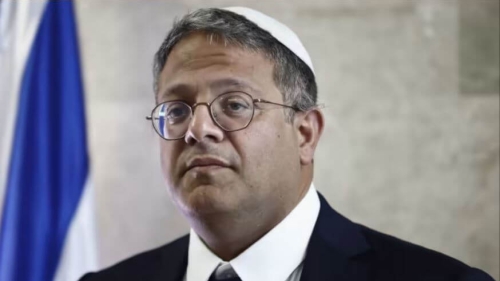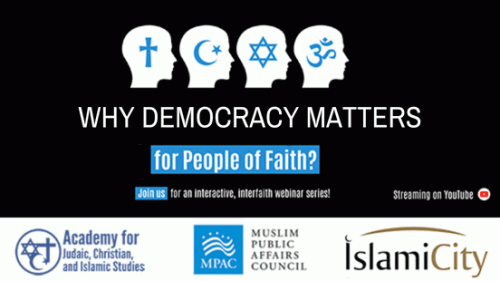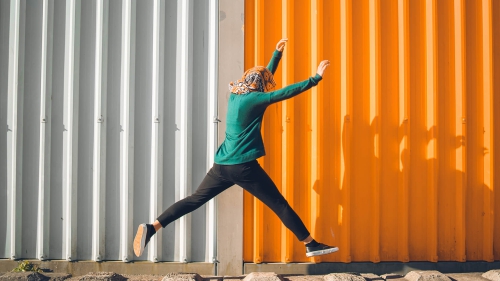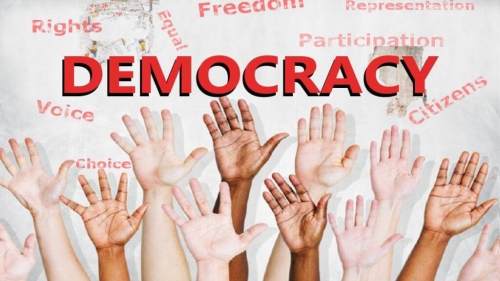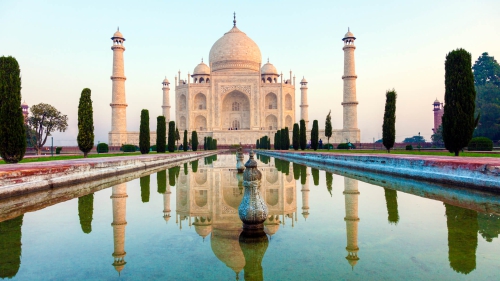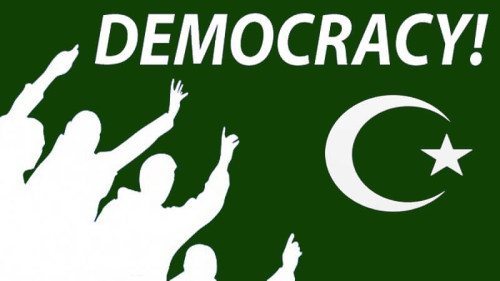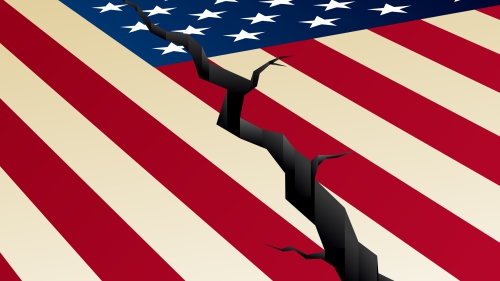Do Egyptians want both democracy and a role for religion in their government?
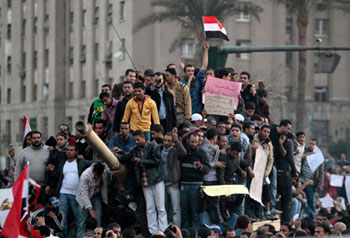 |
The dramatic images streaming out of Egypt over the past week suggest that the 30-year dictatorship of America's close ally, Hosni Mubarak, might be coming to an end.
The world is watching closely to see what kind of country may emerge from the latest popular revolt to rock the Arab world. Yet in the United States, the conversation-- as usual when it comes to the Middle East--seems fixated on the singular issue of Islam, and more specifically, on the role that the Muslim Brotherhood may play in Egypt's future. GOP presidential hopeful Rick Santorum is already drawing parallels between the young protesters calling for an end to the brutal and repressive Mubarak regime, and the popular protests that, three decades ago, brought down another despicable dictator and former American ally, the Shah of Iran. "We abandoned [the Shah] and what we got in exchange was... a radical Islamist regime," Santorum said. Mike Huckabee, another GOP presidential hopeful, joined in the hysteria, warning Americans that, "if in fact the Muslim Brotherhood is underneath much of the unrest [in Egypt] every person who breathes ought to be concerned."
First of all, it should be noted that the Muslim Brotherhood neither launched the revolt against Mubarak (on the contrary, it was quite late in joining it), nor is it now leading it. Although the Brotherhood remains the largest and most organized opposition movement in Egypt, the demonstrations that have caught the world's attention were instigated by tens of thousands of mostly unemployed Egyptian youths who, in providing the most significant challenge to Mubarak's regime in decades, have utterly displaced the more traditional opposition groups in Egypt, including the Muslim Brotherhood. As the Egyptian scholar Emad Shahin told the New York Times,
| "The Brotherhood is no longer the most effective player in the political arena... [This is] a youth uprising. It is the youth that knows how to use the media, Internet, Facebook, so there are other players now." |
At the very least, the youth in Egypt have demonstrated that they do not need the assistance of the Brotherhood and its somewhat ossified institutions to turn the masses onto the streets.
But make no mistake, however the current uprising in Egypt turns out, there can be no doubt that the Muslim Brotherhood will have a significant role to play in post-Mubarak Egypt. And that is good thing.
Despite the wide array of political and religious views on display on the streets of Cairo, Giza, Alexandria, and Suez, the one thing about which the overwhelming majority of Egyptians agree - 95 percent according to a 2010 Pew Research Center poll - is that Islam should play a role in the country's politics. At the same time, a similar Pew poll taken in 2006 found that while the majority of the Western public thought democracy was "a Western way of doing things that would not work in most Muslim countries," pluralities or majorities in every single Muslim-majority country surveyed flatly rejected that argument and called for democracy to be immediately established, without conditions, in their own societies.
For Huckabee and Santorum, as well as for a large segment of the American public, these two polls present a contradiction. How could Egyptians want both a democracy and a role for religion in their government? After all, in the United States it is axiomatic that Islam is inherently opposed to democracy and that Muslims are incapable of reconciling democratic and Islamic values. Never mind that the same people who scoff at the notion that religion could play no role in the emerging democracies in the Middle East are the same people who demand that religion must play a role in America's democracy. Ironically, one of the most vocal proponent of religious activism in politics is Mike Huckabee himself, who has repeatedly called Americans to "take this nation back for Christ" and who, while running for president, proudly declared that "what we need to do is to amend the Constitution so it's in God's standards."
In fact, when it comes to the role of religion in society, Americans and Egyptians are pretty well in agreement. An August 2010 Pew poll found that 43 percent of Americans believe that churches should express political views and play an active role in politics, while 61 percent agreed that "it is important that members of Congress have strong religious beliefs."
There is no doubt that giving religiously inclined organizations and politicians a seat at the political table poses risks. And certainly, problems can arise when religion becomes entangled with the state, as those who recall the Bush administration's evangelistic foreign policy can attest. Nevertheless, since a state can be considered democratic only insofar as it reflects its society, if the society is founded upon a particular set of values, then must not its government be also?
The fact is that democracy cannot take root in large parts of the Middle East without the participation of religious factions who are willing to put down their weapons and pick up ballots instead. That is precisely what the Muslim Brotherhood has done over the last few decades, as it has diligently transformed itself into a legitimate political party and a force for democratic change in Egypt. In 2006, when members of the Brotherhood were first given the opportunity to run for elected office, they proved themselves perfectly capable of responsible governance. Far from trying to transform Egypt into a theocracy, as Arab rulers and western ideologues predicted they would, the Brotherhood fully embraced the principles of democracy by creating political alliances with liberal intellectuals and secular democrats in the Egyptian to lobby for greater political freedoms, including freedom of religion, assembly and speech. Their actions convinced even their staunchest critics that, given the opportunity, they could become a legitimate political force in Egyptian politics, which is why Mubarak turned so violently against them, rounding up their democratically elected members, jailing, torturing and murdering them inside his dank, sadistic prison cells.
Today, the Brotherhood is working closely with opposition leader and Nobel Peace Prize winner Mohamed El-Baradei, who has become the West's best hope for an orderly transition to democratic rule. El-Baradei has rightly brushed aside American fears about the Muslim Brotherhood. "They are a religiously conservative group, no question about it, but they also represent about 20 percent of the Egyptian people," he said. "And how can you exclude 20 percent of the Egyptian people?" Even American analysts like Bruce Reidel, a former CIA officer and head of President Obama's 2009 Afghanistan and Pakistan Policy Review, has rejected the utterly preposterous notion that the Brotherhood want to turn Egypt into another Iran. "[We] should not be afraid of the Muslim Brotherhood," he said. "Living with it won't be easy but it should not be seen as inevitably our enemy."
For decades the United States has swallowed Mubarak's lie that his anti-democratic policies are necessary, that even the slightest weakening of his oppressive, authoritarian regime would result in the immediate takeover by radical Islamists bent on turning into another Afghanistan under the Taliban. The United Nations has dubbed this specious and absurd argument a "legitimacy of blackmail." Now, the same lie is being peddled to Americans by people like Mike Huckabee and Rick Santorum, two men whose views on the role of religion and politics are almost identical to those of the Muslim Brotherhood.
How much longer are we going to fall for it?
*****
Dr Reza Aslan Dr. Reza Aslan, an internationally acclaimed writer and scholar of religions, is a contributing editor at The Daily Beast He is the author of "No god but God: The Origins, Evolution, and Future of Islam".
Source: The Washington Post on Faith
Related Suggestions
So just after establishing prayers is the commitment to "mutual consultation". How then is Islam compatible with "democracy"? That is the human's solution to find and abide within. Including the acceptance of a bit of "taxes" for common infrastructure that would be beneficial to all.
But ignore injustice? Not acceptable!
If we look at the bigger picture we find that the long support, as evidenced by foreign aid, for those that would ignore injustice anywhere frequently translates into injustice everywhere. Of course Mubarak's handlers, Wisner and the squatter state are hoping this will blow over both so others won't rise up and overthrow those accepting this foreign aid as well and that they have fewer people to corrupt into accepting their corruption. But that is the short and local view. When there is injustice someplace, it must spread throughout the streams of power to prevent the ever increasing audience of the injustice from standing against it. Time and final judgment are on the side of the injured.
So let Egyptians decide what kind of government they need to have. In the absence of a truly democratic state in the past decades, setting up an Islamic Republic of Egypt may be a good idea with a mix of modern laws and Sharia to please the majority. Since Mubarak and his gang have not given anything good to Egypt, time to wind up his government.
A pure secular state is a myth. Since majority of Egyptians are Muslims let there be an Islamic state to start with and if it does not work, let people change to something else. At least this way, Egypt will have stability in its existence.
Kam









